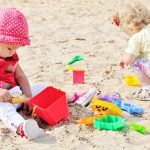 When you think of a baby or toddler, the opposite of self-regulation probably comes to mind: Throwing food despite your dozen reminders not to; hitting a peer even though you just talked about “gentle hands;” rolling on the floor in the throes of a tantrum because you said “no more cookies.”
When you think of a baby or toddler, the opposite of self-regulation probably comes to mind: Throwing food despite your dozen reminders not to; hitting a peer even though you just talked about “gentle hands;” rolling on the floor in the throes of a tantrum because you said “no more cookies.”
Your little one won’t start to get the hang of self-regulating until he’s about 3 ½ to 4 years old, and even then he’ll need help from the grownups in his life. In the meantime, there’s important work to be done to lay the foundation for self-regulation skills later on. We’ll explore how to do that, but first let’s take a look at why self-regulation is important.
Highlights:
|
Why is Self-Regulation Important?
Self-regulation allows us to manage emotions and control impulses. We need it to sustain attention on a task, recognize when our behavior is inappropriate and modify it, avoid unhealthy or dangerous activities, and get along with others.
How You Can Help Your Child Build Self-Regulation Skills
Here’s what you can do now to set your little one up for self-regulation success later:
Help your infant regulate when he’s upset. In order to learn how to self-soothe, certain brain connections need to develop. Every time you soothe your infant — whether feeding him when he’s hungry, changing him when he’s wet, or snuggling him when he’s tired or overwhelmed — you strengthen the brain connections that will one day allow him to soothe himself.
When disciplining unwanted behavior, offer acceptable choices as an alternative. When you step in to stop an unwanted behavior, teach your little one what to do instead. For example: “No throwing rocks. Rocks hurt. Here’s a ball, you can throw this instead.”
Over time, this approach helps your child learn to channel unacceptable behavior into acceptable actions. Here’s another way to think of it: It’s hard to regulate our anger if we never learned acceptable ways to deal with it (walking away for a minute alone, taking deep breaths, etc.).
Model self-regulation. Let’s face it, this one is hard. Babies (and especially toddlers) can be exasperating. But they really do learn from watching the grownups in their lives, so the more you can regulate your own behavior — from eating one cookie instead of five to remaining calm when your tot is pushing your buttons — the more he will learn about regulating his own.
Establish routines. When your routines are out-of-whack, do you feel out-of-whack, too? Daily structure helps all of us feel regulated, especially the youngest among us. Regular times for waking up, napping, going to bed, and eating (along with knowing more or less what to expect throughout the day) help children feel in control.
Play games that encourage focus, taking turns, waiting, etc. Virtually any of the activities in our BabySparks program introduce your child to these concepts, all of which tie into self-regulation. Self-regulation also falls under the umbrella of executive-function skills, which you can read about here.
Nurture emotional intelligence. Emotional intelligence (EQ) helps us understand and manage our emotions and the emotions of others, and is central to self-regulation. You can read about EQ and how to nurture it here.
Nurture social skills. Self-regulation is at the heart of social interaction. It helps us behave within the boundaries of social expectations, and collaborate and get along with others. The social-emotional section of our BabySparks program is a great resource for nurturing these skills.
All babies and toddlers are a work in progress when it comes to self-regulation skills, but some may appear especially dysregualted on a consistent basis. This could be due to temperament, difficulty with sensory processing, or another developmental issue. If you’re worried, your pediatrician or a pediatric occupational therapist can offer guidance.








